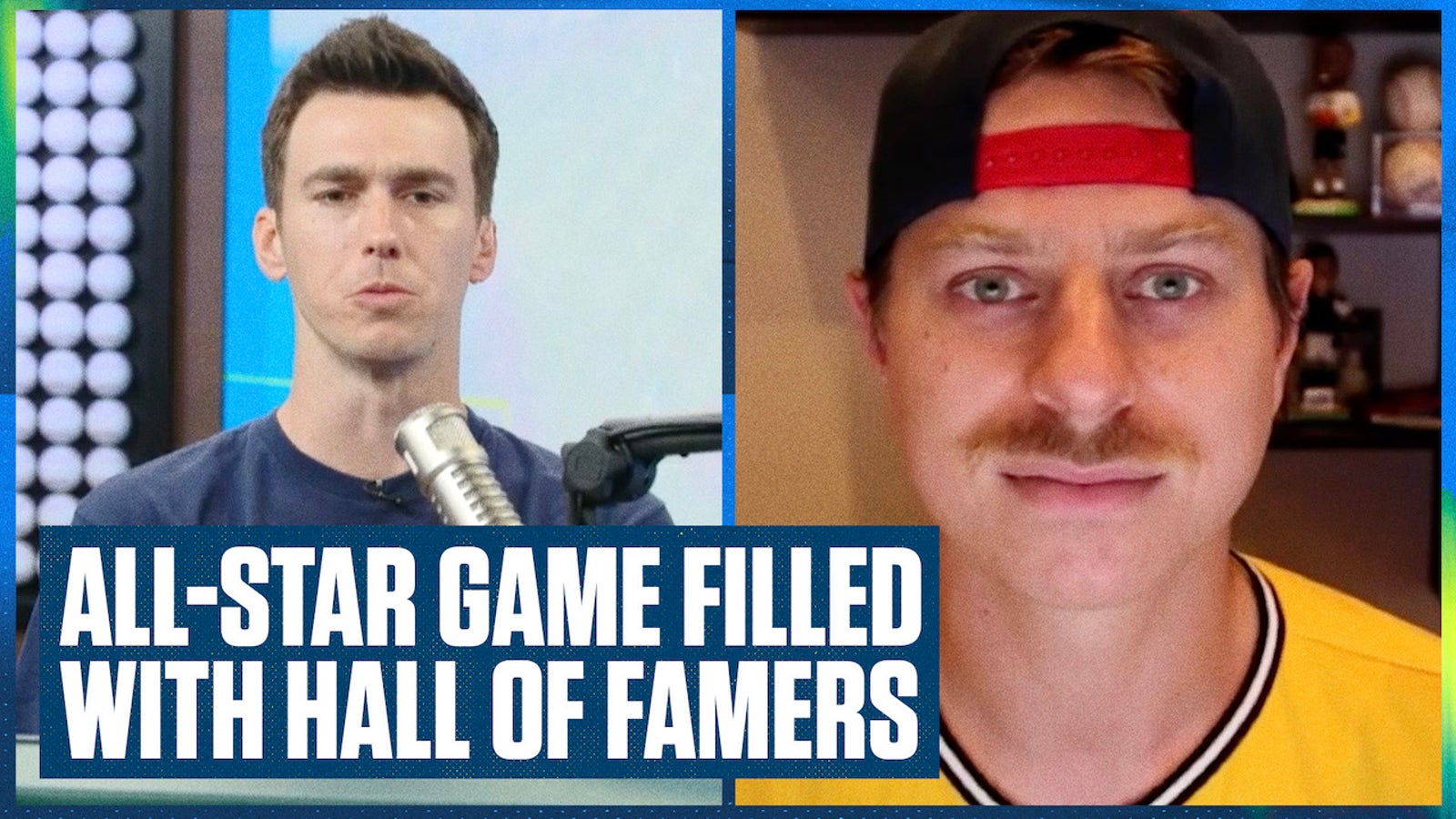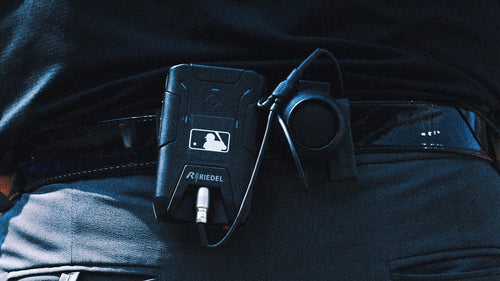
MLB All-Star Game 2022: How many future Hall of Famers will play in L.A.?
By Jake Mintz
FOX Sports MLB Writer
Great players go to the All-Star Game. Great players also end up in the Hall of Fame.
There has to be a lot of overlap, right? If you wanna make it to Cooperstown, you better make a few Midsummer Classics along the way.
But exactly how much overlap is there? And with the 2022 All-Star rosters fresh off the press, how many future Hall of Famers will be at Dodger Stadium on Tuesday (7:30 p.m. ET on FOX)?
MLB All-Star Game: How many future Hall of Famers will be there?
During a recent shower — where all good/bad ideas originate — I realized that I could answer my dumb question with time, research and baseball-reference.com.
How many future Hall of Famers are usually in an All-Star Game?
I went back and looked at how many Cooperstowners were at each Midsummer Classic from 1963 to 2000. Why start with 1963? Well, I originally chose 1961, the year MLB expanded for the first time since 1901, but there were two All-Star Games in ‘61 and ’62 (that's a story for another day), so those years had bigger rosters. That would have messed up my data, so instead I went with 1963.
And why 2000? Well, 2001 was the first All-Star Game for both Ichiro and Albert Pujols, neither of whom has been eligible for induction yet, so it felt incorrect to include that. Also, 2000 is a nice, round number.
From 1963 to 2000, there were an average of 18 future Hall of Famers on the All-Star rosters. If you include the players with steroid connections who would be Hall shoo-ins otherwise — Bonds, Clemens, Sosa, McGwire, Palmeiro, Sheffield, A-Rod — plus the banned Pete Rose, the number bumps up to 20.5. The highest tally was 25 in ‘72, and the fewest was 12 Hall of Famers in ‘76 and ‘89.
What about this year?
The All-Star rosters are out, but they'll change a bit between now and the game. In fact, they're already changing, like they always do. Carlos Rodón, J.D. Martinez and Garrett Cooper were all added Tuesday as replacements. For the purposes of this exercise, we're going with the rosters as of Tuesday night, knowing more changes are coming.
So let's find our 18 or so future Hall of Famers. Again, I'm trying to predict who will get into Cooperstown — not sharing who I think should get into Cooperstown, which, admittedly, is a stupid and impossible exercise, but I'm stupid and impossible.
Note: There are going to be some tough cuts here. But it's important to remember how difficult it is to compile a good enough résumé to get into the Hall. Ask anyone who saw Dave Parker in the mid-'70s whether he'd make the Hall, and they'd scoff at you for asking. In the mid-'80s, Don Mattingly looked like a lock; so did Eric Davis a few years later.
David Wright, Ryan Braun, Andrew McCutchen and Kris Bryant are all recent examples of perennial All-Stars who, whether due to injury, poor play or the horrifying realities of age, will likely fall short of enshrinement.
The point is it's hard to be a Hall of Famer (that's the whole point), which is why this list will look completely idiotic in 20 years.
With that, let's get started.
The locks (5): Clayton Kershaw, Albert Pujols, Miguel Cabrera, Mike Trout, Justin Verlander
All five of these guys are indisputable, inarguable, inevitable Hall of Famers. At this point, Pujols and Cabrera are well past their primes, but they incredibly still have elite bat-to-ball skills. They made the All-Star roster as part of a new initiative by which the league can pluck old legends for one last wave goodbye, which is honestly pretty rad.
Verlander and Kershaw are both still outstanding pitchers, and they would breeze into enshrinement if they retired tomorrow. Trout has more career WAR than Pete Rose, despite having 10,000 fewer plate appearances. He is singular, he is Trout, he is a Hall of Famer.
If you disagree with any of these, you either 1) are cynical 2) are purposefully a bad hang or 3) have some awesome, irrational hot take I need to hear.
The young locks (3): Bryce Harper, Manny Machado, Mookie Betts
All three of these guys are still only 29, and all of them would be talked about way more as generational supernovas if Trout didn't exist. Harper is on a 500-homer pace; Machado could get there, too. Betts has already surpassed 50 career bWAR, with his well-rounded game making him an immensely valuable player.
There are many road bumps on the way to Cooperstown, and there's no crystal ball to see what these players will do in their 30s, but Harper, Machado and Betts are as good a gamble as any.
Now things get a lot harder.
The midway-point guys (5): Paul Goldschmidt, José Ramírez, Giancarlo Stanton, Nolan Arenado, Jose Altuve
Goldschmidt has the narrative richness and cultural pizzazz of a raw potato, but there's a level of statistical success that overrides his white-bread vibe. Before this year, he wouldn't have made this list, but a 1.021 OPS in his age-34 season pushed me over the edge.
I doubt Altuve will get knocked for the Astros' can-banging scandal; time heals all wounds. He has an MVP, three batting titles and, if he ages well, a great shot at 3,000 hits. Every non-steroid guy and non-gambling-suspension guy in the 3,000-hit club is in the Hall.
Stanton is essentially the same argument, but with 500 homers. He's at 369 right now, or 131 away. If he averages 22 bombs for the next six seasons, or 27 for the next five, he'll reach that historic mark. Strikeouts or not, I think he gets there.
Arenado has been the best defensive third baseman, if not the best defensive player, for almost a decade now. That type of label matters. But just remember that David Wright was once a 31-year-old third baseman with one foot in The Hall and an OPS over .870. That's what Arenado is now. He should pass Wright in WAR later this season.
I honestly just think Ramírez is really good. That dude bangs. I pored over Arenado's numbers for a few days but didn't open Ramírez's baseball-reference page more than once. He'll be at about 40 WAR through his age-29 season, which means he arguably belongs in the Betts/Harper/Machado group.
The young guns (4): Rafael Devers, Juan Soto, Ronald Acuña Jr., Vlad Guerrero Jr.
Soto was the easiest of these four. At 23, he's younger than Adley Rutschman and already has 20 bWAR, two silver sluggers, two All-Star Games and a World Series ring. Soto's patience-focused skill set should age beautifully over the next two decades. He might not get to any of the big milestone numbers because he walks so much, but that won't matter.
I think Devers just rakes. He has been in our baseball-loving lives forever, but he's still only 25. He's such a smart hitter. Yes, he's a bad defender, but have you seen him swing? It would help narrative-wise if the Red Sox keep him around. But again, this dude rakes. Just watch him.
"Down-Year Vlad" has 19 homers and an OPS over .800 at the break. That's a heck of a down year. A key to compiling enough fancy stats to make the Hall is starting early. Vlad is only nine bombs away from 100 career homers in his age-23 season.
Acuña's surgically repaired leg, high-effort swing and relative reliance on bat speed make me a bit hesitant, and he was one of the last names on this list even though he's a dynamo. But then I remembered how obscenely good he was in 2021 before his ACL went kaboom, and that swayed me.
Ronald Acuña Jr.'s comeback
The last spot?
For my 18th and final pick, I narrowed it down to: Gerrit Cole, Aaron Judge, Shohei Ohtani, Julio Rodríguez and Josh Hader.
Cole was my first cut. Even though standards for pitchers should drop as the times change and nobody throws more than 200 innings per season, Cole just hasn't been dominant for long enough. He truly morphed from Gerrit Cole to GERRIT COLE after being traded to Houston in 2018 at age 27. He hasn't even been that great this season. He has no Cy Young awards. It's smart to gamble against the pitcher.
I'm a sucker for relievers (put 2022 D-Backs All-Star Joe Mantiply in!), so Hader was alluring, but bullpen arms are just so volatile, and the great ones have to be durable and pitch for so long that it just wasn't worth the spot.
Mariners phenom Rodríguez's being only 21 is a double-edged sword. He has a great head start, yes, but he also has a lot of time for things to go wrong. What if teams find a hole? What if he can't adjust? I need to see more than half a season of dominance.
That leaves us with Ohtani vs. Judge. I'm sure this one will be discussed civilly in the comments.
Ohtani vs. Judge
What Ohtani is doing now is obviously remarkable, jaw-dropping, historic, big adjective after big adjective, you know the deal. He's a one-of-a-kind player doing a one-of-a-kind thing, day after day after day.
Ohtani News: First to make ASG as a pitcher and hitter
I hope he can keep doing it for another 10 years.
He has been an elite player for only a year and a half, and being a two-way player has to eventually take its toll on his body. Plus, he got a relatively late start in compiling career numbers. If he can keep Ohtani-ing for another four, maybe five seasons and remain a productive power hitter for a few seasons after that, then I think maybe he gets in. He could make it even if his career WAR total doesn't stack up because what he has accomplished is so impressive and so singular.
Judge has a mixed résumé, too. He, like Ohtani, didn't debut until he was 25. He has never won an MVP, he's already 30, and he has "only" 188 home runs. For every Jim Thome, there are five enormous sluggers who don't age well into their 30s. The present is electric, but the future remains murky for Mr. Judge.
If he's a career Yankee with 400 home runs, an MVP or two and some iconic October moments, it could make up for his late start. But if he signs with, say, the Padres this winter and starts his decline sooner rather than later, we're looking at Frank Howard or Dave Kingman.
All that said, I lean Judge. I think he has a better shot to age well and compile moments and not just fun facts about playing two positions. I'm not trying to be a sourpuss about Ohtani — he's quite literally the most remarkable ballplayer we've ever seen — but I think Hall of Fame voters are likely to ding him if he doesn't reach certain milestones.
There you have it, my 18 Hall of Famers. Make sure to call me an idiot in the comments, an imbecile in the replies, etc., etc. I'm sure my colleague Ben Verlander will be very measured about my leaving Shohei off this list.
Sometimes the truth stings.
Jake Mintz is the louder half of @CespedesBBQ and a baseball writer for FOX Sports. He’s an Orioles fan living in New York City, and thus, he leads a lonely existence most Octobers. If he’s not watching baseball, he’s almost certainly riding his bike. You can follow him on Twitter @Jake_Mintz.













